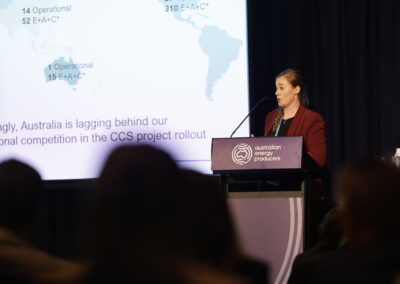
A word from the CEO
Australia's moment to lead: cementing global leadership in CCS through policy and innovation

The last month has been a stark reminder that the national and international debates are rapidly evolving, creating challenges and opportunities to drive our response to climate change.
The appointment of Senator Murray Watt as Minister for Environment and Water and Senator Tim Ayres as Minister for Industry and Science will bring fresh perspectives to these important portfolios. We look forward to working constructively with them and their cabinet colleagues continuing in their roles, including Minister for Climate Change and Energy Chris Bowen and Resources Minister Madeleine King.
After wild swings in energy and climate policy settings over the last two decades, the next parliamentary term is a critical opportunity to shape forward-looking policy. The Albanese Government’s strong commitment to increasing the role of gas and renewables in driving emissions reduction must be matched with aligned technologies such as CCS to enable Australia to reach its emission reduction targets.
Meaningful support for CCS was provided by the Albanese Government in its first term, including funding for CO2CRC’s collaborative research with partners from Japan and Korea.
This came during a period when two world-class Australian CCS projects consolidated their standing. The Moomba CCS project in South Australia and the Gorgon offshore in Western Australia are two of the world’s most significant pure-play carbon storage projects and demonstrate our national capability.
However, sustained and increased investment in CCS technology is essential to ensure all our emitting sectors meet emissions targets and avoid significant penalties. Together with our research partners, we are leading efforts to develop more efficient and cost-effective technologies, improve storage methods, and help shape the policy frameworks that will guide CCS deployment in Australia.
CO2CRC stands ready to support the Government’s decarbonisation efforts through our innovative CCS research and demonstration program. With the right backing, industry can deliver the next wave of cost-effective and scientifically sound CCS projects.
Over the last month, I have attended industry events in Rotterdam, Vienna, and Brisbane.
A constant theme in all these discussions has been that if technology is to drive abatement reduction, we need to invest in technology.
Given the scale of CCS investment required to meet climate targets, it seems evident that this must see significant contributions from the public and private sectors. This was a key subject at International Energy Agency Greenhouse Gas (IEAGHG) Executive Committee meeting in Rotterdam.
Public support can be delivered through direct allocation of taxpayer funds or by incentives to encourage private sector investment. An example is the so-called 45Q tax credits which support carbon capture, direct air capture, or carbon utilization projects in the US. There had been some expectation that President Trump may have ended these exemptions in his ‘Big Beautiful Bill,’ but they remain untouched as the legislation passed the House of Representatives last week.
While that is encouraging for global investment in CCS, the incentives could make it hard for countries that do not match those incentives, such as Australia, to attract investment.
Keeping Australia internationally competitive and maintaining our leadership in CCS research and development is a high priority for CO2CRC.
To that end it is gratifying to see CO2CRC continuing to win recognition, including in two major awards in recent weeks.
CO2CRC received national recognition at the 2025 Cooperative Research Australia Awards for Excellence in Innovation, taking home the prestigious Award for Enduring Industry–Research Collaboration. The award recognised our work over 20 years in proving that CCS is a technically, environmentally and economically feasible option for limiting CO₂ emissions. This achievement was made possible through long-standing collaboration between industry, government, and research institutions. By combining our scientific partners’ deep technical expertise with the practical insights and investment of industry stakeholders, CO2CRC has demonstrated how trusted partnerships can accelerate innovation and deliver real-world climate solutions. Our success underscores the critical importance of collaboration in addressing complex energy and environmental challenges.
And a major highlight of the Australian Energy Producers conference in Brisbane last week was the presentation of the prestigious Lewis G. Weeks Memorial Gold Medal to CO2CRC’s Dr Geoff O’Brien, recognising his outstanding contribution to geoscience in Australia. This honour reflects not just Geoff’s leadership, but the broader impact of CO2CRC’s research community on Australia’s low-emissions future.
These are all significant markers on our research and development journey and testament to the close collaboration between our members and other government and industry participants.
If we are to meet our energy and climate challenges it is essential that this continues.
Dr Matthias Raab
CEO
Sharing Knowledge, Shaping the Future: CO2CRC at AEP 2025
At the heart of innovation lies collaboration, and this year’s Australian Energy Producers (AEP) Conference and Exhibition was no exception. CO2CRC was a proud sponsor of the conference and through our presence at the Meeting Zone and with six of our experts speaking at the event, was able to play a central role in progressing the conversation around carbon capture, utilisation, and storage (CCUS).
A pervasive theme of the conference was the critical role of gas in underpinning the transition to renewable energy. Even as renewable energy projects increase, worldwide demand for energy is up 2.2% on last year and fossil fuels still make up approx 80% of the energy mix (as has been the case for about 50 years) reinforcing the importance of CCUS to provide real, immediate carbon emission reductions.
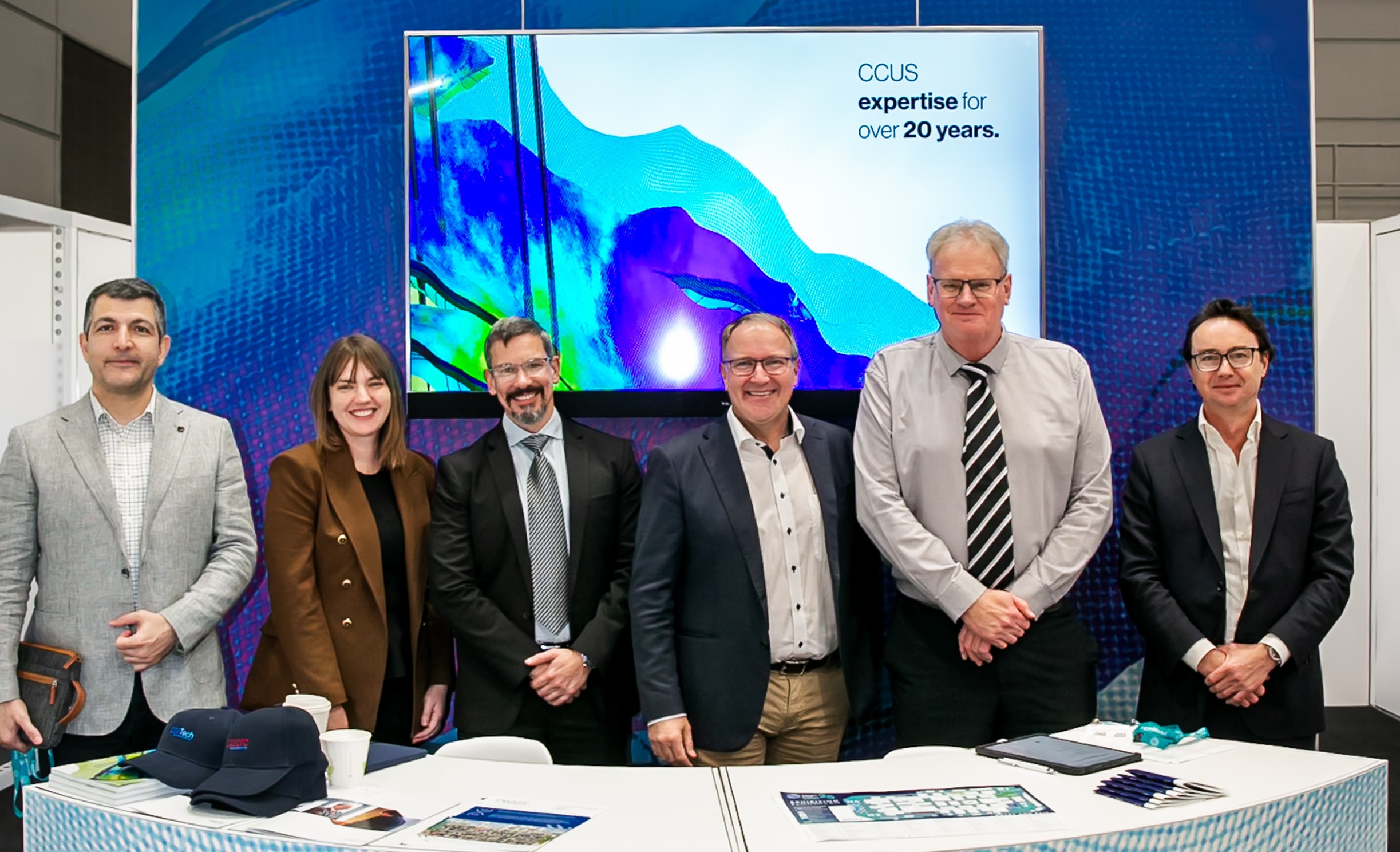
CO2CRC staff left to right: Dr Hadi Nourollah, Genna Petho, Paul Barraclough, Dr Matthias Raab, Dr Geoff O’Brien, and Justin Thompson.
A highlight of AEP 2025 was the presentation of the prestigious Lewis G. Weeks Memorial Gold Medal to CO2CRC’s Dr Geoff O’Brien, recognising his outstanding contribution to the field of petroleum geoscience and engineering. This honour reflects not just Dr O’Brien’s leadership, but the broader impact of CO2CRC’s research community on Australia’s low-emissions future.
Our team’s presentations spanned critical themes, from hub optimisation and business models to subsurface fluid migration and monitoring strategies. Together, these talks demonstrated both the scientific rigour and real-world applicability of CO2CRC’s research.
- Dr Simone de Morton outlined a national roadmap for carbon capture and storage deployment, identifying key constraints and opportunities in the Australian context.
- Dr Max Watson discussed life-of-field monitoring strategies that validate containment and improve long-term storage performance.
- Dr Hadi Nourollah, in his co-presentation, explored calibrated models that improve understanding of subsurface CO₂ migration.
- Genna Petho delivered two compelling presentations: one examining current and emerging MMV (measurement, monitoring and verification) technologies, and another, co-presented with Dr Hadi Nourollah, revealing advanced techniques for fault zone characterisation in CO₂ storage.
- Saw Hong Lim showcased a breakthrough adsorbent technology for separating CO₂ from methane—offering promise for cleaner gas processing.
- KS Chan introduced COSMIC, a novel business modelling tool designed to optimise CCUS hub configurations for technical and commercial viability.
To explore the abstracts for these presentations, please click here.
CO2CRC’s presence at AEP 2025 reinforced our ongoing commitment to collaboration, knowledge sharing and technological advancement. As CCUS continues to evolve from concept to infrastructure, robust scientific exchange and industry partnerships are more important than ever. Please click on the images below to view a gallery relating to the CO2CRC team’s activities at AEP 2025.
Missed one of our sessions or seeking more information on how to achieve you carbon reduction targets? Reach out to our team—we’re always happy to share more information about our work and explore new opportunities to collaborate.
Distinguished Recognition for CO2CRC Chief Scientist at AEP 2025
CO2CRC’s Chief Scientist, Dr Geoff O’Brien, has been awarded the Lewis G. Weeks Memorial Gold Medal, one of the highest accolades in Australian petroleum geoscience, in recognition of his exceptional lifetime contributions to exploration, innovation, and mentoring.
Presented on 28 May during the Australian Energy Producers (AEP) 2025 Conference, the award honours individuals whose work has profoundly advanced petroleum exploration and production. It commemorates Dr Lewis G. Weeks, a pioneer of Australia’s Bass Strait development.
Dr O’Brien’s career spans over 40 years, during which he has significantly influenced regulatory reform, scientific research, and team leadership across Australia’s energy sector. His scholarly impact includes more than 100 technical papers and an equal number of abstracts, covering topics from high-resolution depositional zones to petroleum systems and carbon capture and storage (CCS) frameworks.

AEP Chair and Woodside CEO & MD, Meg O’Neill, presents CO2CRC Chief Scientist, Dr Geoff O’Brien, with the Lewis G. Weeks Memorial Gold Medal.
A multiple recipient of Best Technical Paper awards—including recent recognition in 2024 for work on CCS regulation—Dr O’Brien has served in senior roles at Geoscience Australia, Geoscience Victoria, and NOPTA, as well as across academia and industry.
“It is phenomenal and a well-deserved recognition for Geoff,” said CO2CRC CEO Dr Matthias Raab. “The Lewis G. Weeks Medal reflects the enduring legacy he has created—not just in science, but in Australia’s energy future.”
The award marks the third major accolade for CO2CRC in May 2025, following a SGD$100,000 Liveability Challenge win and success at the Excellence in Innovation Awards.
About the Award
The Lewis G. Weeks Memorial Gold Medal celebrates technical excellence and leadership that strengthen Australia’s petroleum exploration landscape. It also honours the spirit of collaboration and scientific ambition that continues to drive the sector forward. Click on the gallery below to view images of Dr Geoff O’Brien’s remarkable achievement.
CO2CRC Honoured for Long-Term Industry-Research Impact at 2025 CRA Awards
CO2CRC has received national recognition at the 2025 Cooperative Research Australia (CRA) Awards for Excellence in Innovation, taking home the prestigious Award for Enduring Industry–Research Collaboration. This accolade celebrates our role as a cornerstone in the development of carbon capture and storage (CCS) in Australia and beyond.
What Set CO2CRC Apart?
For more than 20 years, CO2CRC has championed collaborative, research-driven solutions to industrial decarbonisation—delivering science-backed innovations that are now guiding real-world emissions reduction strategies. The award reinforces the strength of our partnerships and the significance of our contribution to Australia’s clean energy transition.
CRA’s award highlights the long-lasting impact of effective collaboration between industry and the research sector. Our submission showcased:
-
Ongoing CCS research excellence since 2003, continuing a proud legacy even after transitioning from CRC status in 2015.
-
The development of the Otway International Test Centre (OITC), recognised globally as a benchmark site for end-to-end CCS testing.
-
A broad and diverse membership base, encompassing more than 30 partners from industry, academia and government.
-
The successful translation of R&D into deployable outcomes, such as low-cost monitoring solutions and our HyCaps modular carbon capture technology.
-
Leadership in informing policy, regulatory design and commercial strategies for CCS deployment across the Asia-Pacific region.
This award is a collective win—acknowledging not just CO2CRC’s achievements but the ecosystem of contributors who continue to drive the success of our programs.
Our Unique Value to Members
CO2CRC occupies a rare position—where cutting-edge science intersects with commercial reality. Through our integrated model, members gain:
-
Exclusive access to Australia’s only dedicated CCS field trial site for real-world technology validation.
-
Co-investment opportunities in applied research designed to reduce cost, de-risk projects and accelerate uptake.
-
Connections to global CCS initiatives and funding opportunities through strong government and international networks.
-
Technical insight and strategic foresight developed over two decades of field experience.
-
The chance to actively shape the next generation of emissions reduction solutions through collaborative innovation.
“The award reflects two decades of work, by visionary leaders before me,” said Dr Matthias Raab, CO2CRC CEO. “[It recognises] a dedicated and professional board, brilliant colleagues, and staff, and hundreds of researchers.”
Chair of CO2CRC, Martin Ferguson AM, accepted the award, reaffirming CO2CRC’s place as a long-standing leader in applied CCS research and a trusted adviser in the global transition to low-carbon energy systems.
Looking ahead, CO2CRC remains focused on advancing breakthrough technologies in carbon capture, utilisation and storage—creating scalable projects that meet industrial challenges and support global net zero goals.
We extend our thanks to Cooperative Research Australia for this recognition, and to our members whose ongoing support fuels our success. You can learn more about the win by clicking here.
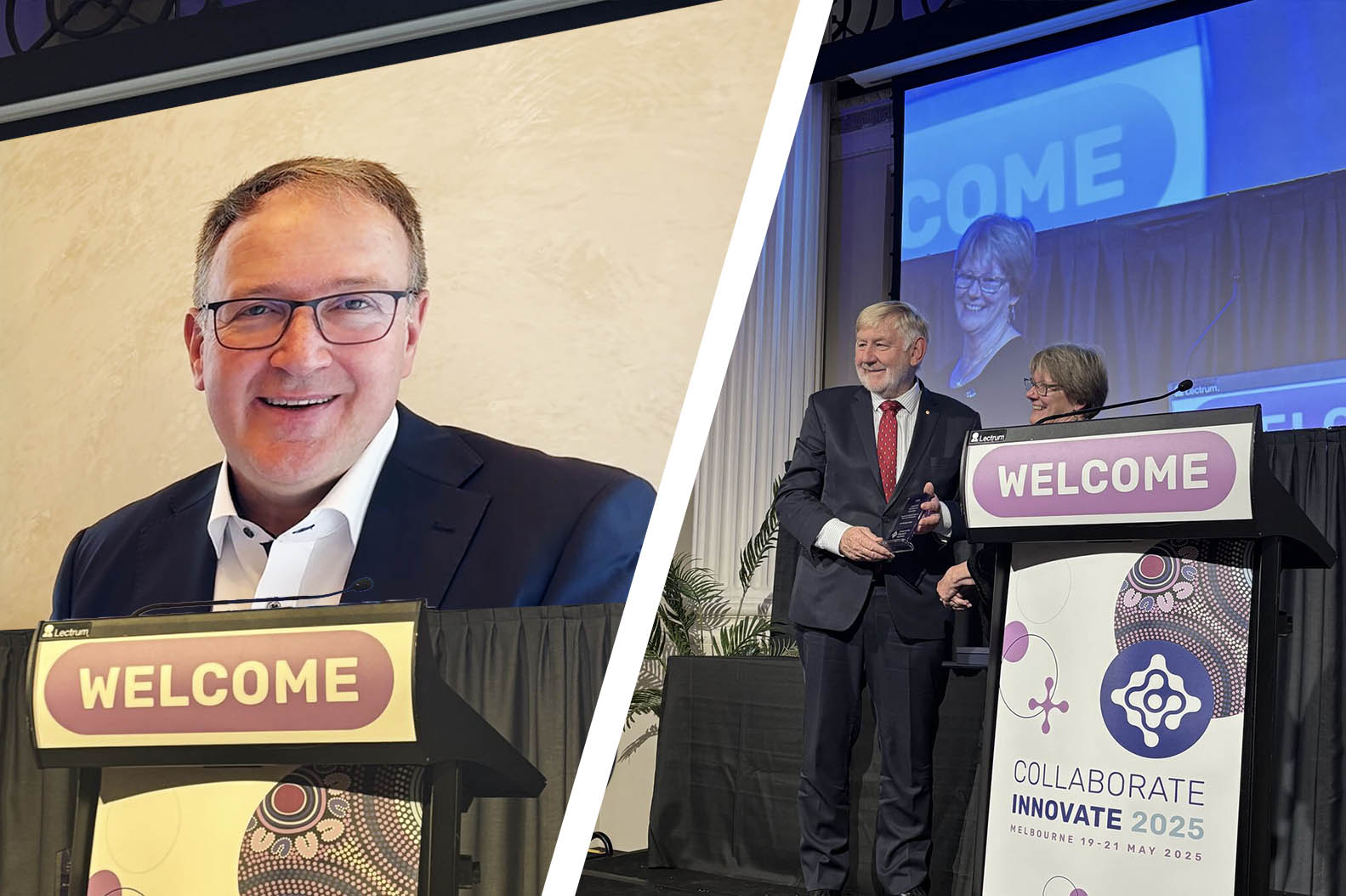
Photo Gallery: CO2CRC’s Dr Matthias Raab, who was overseas, recorded a message to thank the CRA for the award (left), while CO2CRC’s Chair, Mr Martin Ferguson AM, accepted the award for CO2CRC at the ceremony.
Otway International Test Centre: A Global Nexus for Carbon Storage Innovation
The Otway International Test Centre (OITC) is more than a research facility — it’s the epicentre of innovation where scientists, engineers, government officials, and global industry leaders converge to shape the future of Carbon Capture and Storage.
A Living Laboratory for Carbon Storage
Operated by CO2CRC, the OITC is a globally unique, fully instrumented CCS research site. In the past year, the site has been pivotal in multiple groundbreaking initiatives, including:
- Otway Stage 4 Program, including the drilling of the CRC-8 monitoring well and the recompletion of CRC-3 for CO₂ injection, with international support from RITE (Japan), KIGAM (Korea), and funding from the Australian Government. This infrastructure will deliver new insights and critical data for mapping CO₂ movement in storage reservoirs – providing evidence and confidence for governments to approve storage projects.
- The Shallow Fault Experiment, which involved injecting CO₂ into the surface at shallow depth to study its migration across a fault system, monitored with novel technologies at unprecedented detail to fundamentally and practically address the risk of CO₂ leakage.
- The GeoCquest Field Validation (GFV) Project, which saw 10,000 tonnes of CO₂ injected to see how small-scale geological features affect the flow and trapping.
Global Research Destination
Over the last two years, the OITC has hosted a range of distinguished visitors:
- Delegations from Tokyo Gas, Petronas, Cheng Kung University (Taiwan), CPC Corporation, the Japan Society of Energy and Resources, and South Korea’s Department of the Environment all toured the site to witness firsthand its world-leading infrastructure and experiments.
- The CO2CRC Symposium 2023 brought over 50 international and domestic visitors to the OITC, many seeing an operational injection site for the first time.
These visits have underscored Australia’s role as a preferred partner for international CCS collaboration, particularly for countries like Japan and Korea that seek secure geological storage beyond their borders. Research and innovation underscores the unique role of the OITC as a testing ground for global innovation.
Bridging Public Engagement and Scientific Rigour
Beyond expert audiences, CO2CRC opened the OITC to the local public in April 2025, welcoming community members, local government, teachers, and industry operators. Visitors explored the gas plant, injection wells, and monitoring systems — an experience that demystified CCS and built trust in its safety and necessity.
On a dedicated South Korean Media Day, CO2CRC fielded in-depth questions about the reliability of CCS and Australia’s potential role in sequestering CO₂ from abroad, reinforcing the maturity and regulatory robustness of its approach.
The Road Ahead
With major injection experiments scheduled through 2026 — including Microbubble Injection projects — the OITC is positioned to yield insights that could redefine global best practices in carbon storage. The success of these experiments, coupled with CO2CRC’s commitment to innovation, regulatory leadership, and education, make the OITC not just a facility, but a beacon for true emission reduction towards a net-zero future.
If you’d like to visit the OITC, drop us a line at info@co2crc.com.au.
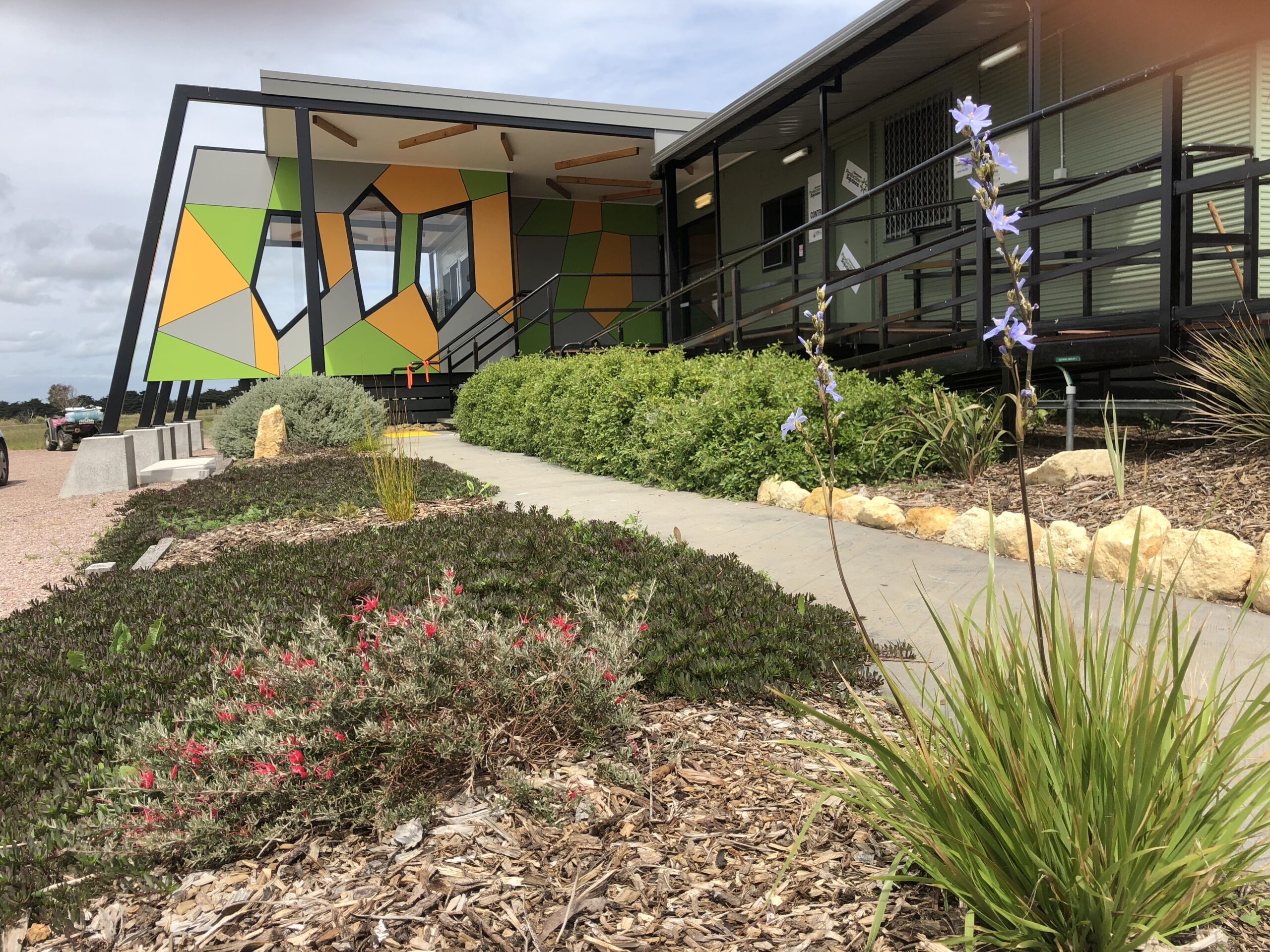
At the frontier of carbon innovation: The Knowledge Hub at the OITC.
Shallow Fault CO₂ Injection – A Global First in CCS Science
CO2CRC is proud to share an update on the Shallow Fault Injection Project—a globally unique research initiative and the only one of its kind where CO₂ has been deliberately injected into a shallow fault zone under tightly controlled and deeply monitored conditions.
The project has successfully reached a major milestone, delivering strong results that deepen our understanding of faulted geological systems. But the science doesn’t stop there.
Thanks to extended post-injection monitoring and analysis, researchers are beginning to uncover how:
- CO₂ disperses through porous formations and interacts with groundwater
- Faults and fracture systems respond to controlled CO₂ injection
- Observed behaviour compares to forward-prediction models
While that milestone has been achieved, the project continues to be a scientific giving tree—with ongoing data acquisition and new insights emerging that are vital for the calibration of fault-related risk frameworks in CCS.
Ongoing monitoring is currently being conducted by Curtin University led by Prof Roman Pevzner, focusing on:
- Cross-hole seismic tomography
- Electrical resistivity imaging (ERI)
These activities build upon the strong foundational work by our research partners:
- Geoscience Australia, for their leading role in soil flux and gas monitoring
- RMIT University, for groundwater sampling and baseline assessment
- RITE (Japan), under Dr Ziqiu Xue, for contributions to distributed strain sensing and geomechanical interpretation
These combined efforts created a robust platform for follow-up studies and continue to inform both Otway Stage 4 and CO2CRC’s Future Program.
We thank all contributors for their dedication to advancing CCS science. This is a shared journey—and the story is still unfolding.
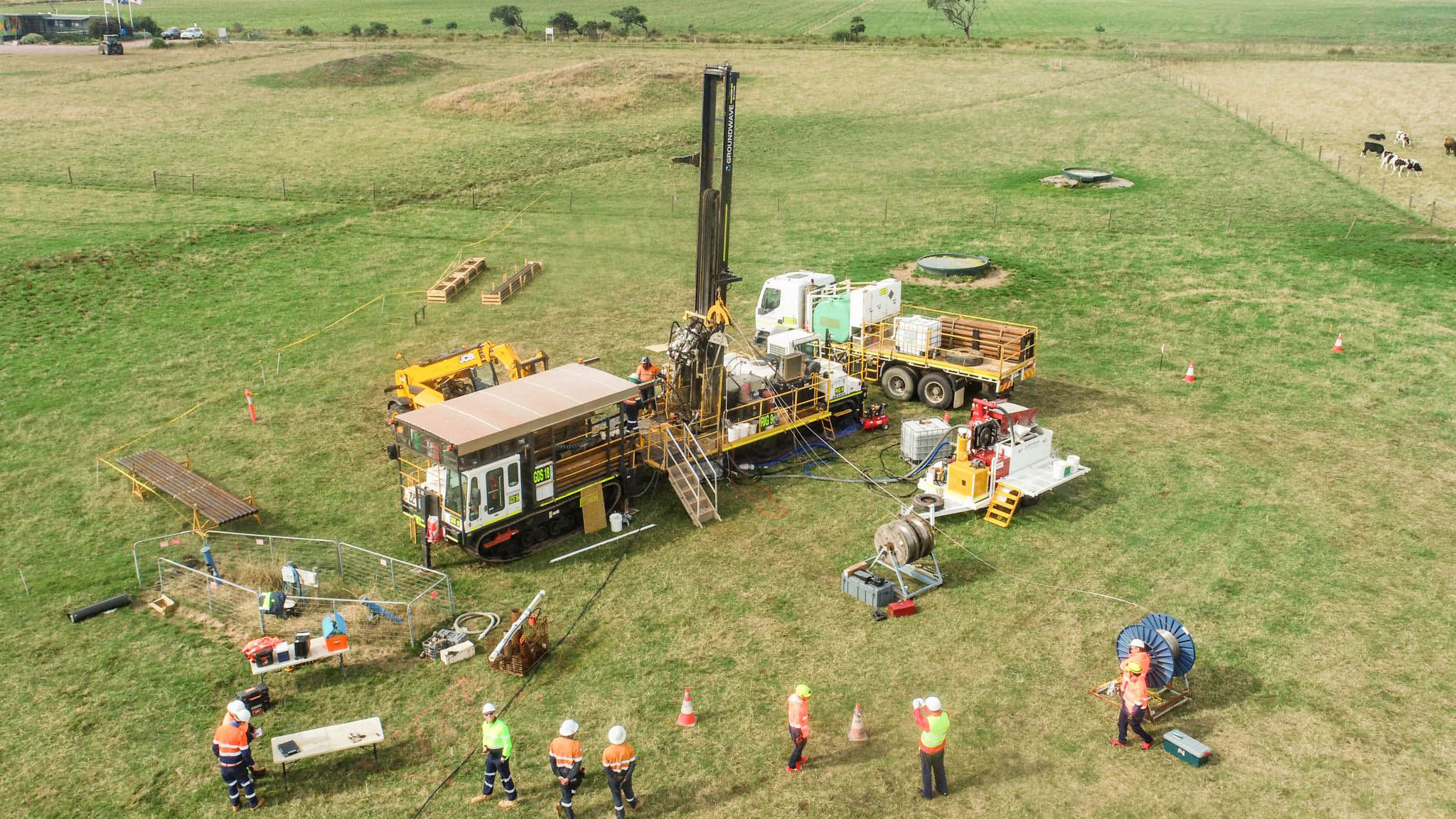
Breaking ground on climate tech: An aerial view of the world’s first CO₂ injection into a shallow fault, captured at the Otway Test Centre in Victoria, Australia.

More information coming soon. For sponsorship enquiries, email justin.thompson@co2crc.com.au
CO2CRC Training and Education
At CO2CRC, we believe that effective CCUS education and training is a vital element in shaping a sustainable, low-emission future. As such, we are dedicated to equipping a wide array of stakeholders, including industry experts, policymakers, investors, scientists, and the general public, with the knowledge and tools necessary to achieve their emission reduction targets. CO2CRC provides a range of general CCUS educational courses as well as technology specific and tailored CCUS training. Upcoming courses over the next few months include CCS Fundamentals. Contact Max Watson for more information.

CCS Education Course for Regulators, Government Policymakers, and Non-Technical Professionals
4 July 2025
The CCS (Carbon Capture and Storage) education course will equip non-CCS technical professionals, regulators, policy makers, and government officials working within or around the CCS ecosystem, with an understanding of the essential elements of CCS
The course will explore a range of subjects including the fundamentals of CCS, common misconceptions surrounding CCS, the complexities and opportunities specific to CCS and an exploration of CCS projects around Australia, both onshore and offshore.
Presented by our CCS tecnho regulatory expert Dr Simone De Morton.
“On behalf of Cooper Energy, I commend CO2CRC for their excellent CCUS course. It provided a comprehensive overview of the opportunities, complexities and challenges across all aspects the carbon capture, utilisation and storage sectors.” – James Clarke, Cooper Energy.
Limit of 20 places available. Secure your spot today:
Contact Max Watson or read for more information.
Follow CO2CRC today on LINKEDIN to keep up to date with the latest news on our ground-breaking demonstration and research projects.
Energy Transition News
26/05/2025 Asia’s largest offshore oil platform now doubles as CCS site – Upstream. The Chinese project captures CO₂ produced during oil extraction, compresses it and injects it for permanent storage.
26/05/2025 Carbon capture essential for scaling net-zero concrete, says global cement producer– Reccessary CCS is set to play a key role in decarbonising the cement and concrete industry, says Jan Theulen, Group Lead CCUS at Heidelberg Materials.
26/05/2025 UN tackles carbon credit credibility with new standards – Energy Connects. A UN body responsible for establishing the international carbon market under the Paris Agreement has adopted new standards to ensure the credibility of emissions-cutting projects.
25/05/2025 Borna to Invest $40mn for Natural Gas Separation, Carbon Capture Facility Egypt – egyptoil. Leading Canadian clean-tech company, Borna Membrane Solutions plans to invest $40 million to establish a CCS facility for the Egyptian natural gas network.
24/05/2025 MIT Breakthrough Makes Carbon Capture 6x More Efficient – Scitech daily. MIT researchers have developed a powerful improvement to carbon capture tech by using nanofiltration membranes to separate key chemical ions, drastically enhancing efficiency and stability.
23/05/2025 EU Sets New CO2 Storage Mandate For Major Oil And Gas Producers – Carbon Herald. The EU has issued new rules obligating key oil and gas companies to help build CO2 storage capacity.
19/05/2025 CarbonPlan Launches CDRXIV – A New Platform For CDR Research – Carbon Herald CarbonPlan Canada has launched CDRXIV a new online platform for CDR research.
19/05/2025 Inpex Leads Santos for First North Australia CCS Hub – Energy Intelligence The Inpex-led Bonaparte offshore CCS project is moving ahead, with start-up eyed for 2030.
18/05/2025 Denmark: 10 companies selected to compete for Denmark’s CCS Fund with DKK 28.7 billion for Carbon Capture and Storage – Energy-pedia News The Danish Energy Agency has selected 10 companies to compete for DKK 28.7 billion CCS funding.
17/05/2025 Swiss firm that captures carbon from air to cut workforce by more than 10% – The Guardian. Downsizing at Climeworks comes amid economic uncertainty and ‘reduced momentum’ for climate tech.
15/05/2025 Norway’s next offshore carbon capture project takes step forward – upstreamonline Two CCS test wells completed on Equinor’s proposed Smeaheia project.
14/05/2025 IRFA: Anti-carbon capture legislation a blow to future ethanol and corn markets – ethanol producer On May 12, the Iowa Senate voted 27-22 to pass House File 639, effectively banning CCS projects in the state.
14/05/2025 Labor does diplomatic dance on climate targets – AFR. The Albanese government will need to produce an ambitious near-term emissions reduction target before September if its plans to host a major UN climate summit in Adelaide in 2026 are to be taken seriously.
12/05/2025 BKV And Copenhagen Infrastructure Partners Launch $500M CCUS Venture – Carbon Herald BKV Corporation has unveiled a new joint venture with Copenhagen Infrastructure Partners, aimed at accelerating CCUS development across the US.
12/05/2025 Carbfix Receives Europe’s First Onshore CO2 Storage Permit Under EU Law – Carbon Herald Iceland-based Carbfix has become the first company to receive a permit for onshore geological storage of CO2 under the EU’s Carbon CCS Directive.
09/05/2025 Even as emissions level off, CO2 in the atmosphere is growing faster than ever. – CSIRO. carbon sinks are showing signs of faltering as we continue to emit CO₂.
09/05/2025 UK and Norway step up cross-border CO2 storage plans – gasworld The UK and Norway plan to develop a North Sea hub for the cross-border storage of CO2.
08/05/2025 Harbour Energy to cut 250 jobs in Aberdeen and review CCS– The Chemical Engineer. THE UK’s largest oil and gas producer is cutting 250 jobs in Aberdeen and reviewing its support for the Viking CCS project.
05/05/2025 Enagás And Calcinor To Capture 900,000 Tons Of CO2 Annually -Carbon Herald. Spanish energy infrastructure company Enagás has entered a strategic partnership with industrial lime producer Calcinor to cut up to 900,000 metric tons of CO2 emissions each year.
Subscribe
Know a friend or colleague who would be interested in CO2CRC’s Insights Newsletter?
Tell them to subscribe below






